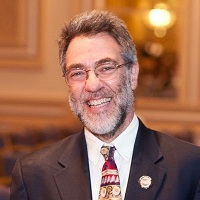 William Hersh, MD, Professor and Chair, OHSU
William Hersh, MD, Professor and Chair, OHSU
Blog: Informatics Professor
Twitter: @williamhersh
Recently the Governor of Oregon lifted the state’s indoor mask mandate and ended the state’s public health COVID-19 emergency. Like most US states, Oregon had a large Omicron wave of cases, hospitalizations, and deaths, although as through all of the pandemic still far below US national averages. At Oregon Health & Science University (OHSU), the number of patients in the hospital and ICU continues to fall each day. The mask mandate in non-healthcare buildings at OHSU has been dropped and my department will return to some activities in-person with the start of the spring quarter at the end of March.
Will the pandemic finally recede now and allow us to return to an albeit new normal? We have been down this road before. The first came in the late spring and early summer of 2021. Vaccination had become relatively widespread, and the large wave of hospitalizations and mortality from late 2020 and early 2021 appeared to be subsiding. In Oregon, all mask and other public health mandates were lifted, and life seemed to be returning to normal.
Sadly, however, the Delta wave started in the late summer of 2021 and dashed hopes that the fall would see a return to relative normal. As the Delta wave subsided in the late fall, a second era of opportunity seemed to be coming again. Although somewhat more muted than the first reprieve, it looked as if a modified normal might occur in early 2022.
But then, of course, Omicron came, and with it a new wave of hospitalizations and mortality. One fortunate aspect of the Omicron wave is that there has been clear evidence that vaccination provides protection. Even if not preventing SARS-CoV-2 infection completely, vaccination does appear to limit the worst of the infection for most people.
Now the Omicron wave is receding, and hopefully the worst of the pandemic with it. Although some might be gun-shy to feel optimistic, it is clear that there can be a path to living with the virus and a new approach that balances public health requirements with individualizing risk. I look to those physician experts who express cautious optimism and allowing of individual decision-making within the extremes of those at the ends of the spectrum. My favorites include Ashish Jha, Bob Wachter, Leana Wen, and of course the prolific Eric Topol. I also believe that the federal government’s new COVID-19 plan is reasonable, with its emphasis on vaccination, testing, and treatment. This is especially the case with new oral anti-viral treatments shown to be highly effective.
The most unfortunate aspects of this pandemic has been its politicization, it becoming part of the culture wars in the US. I am not unsympathetic to those who want to move on. I do not particularly enjoy wearing masks, even though I do so and will continue doing so when it is necessary to protect myself or others. It saddens me that one of the most speedy and effective vaccines ever developed is being met by so much resistance. In addition, the manipulation and misinformation is saddening for a medium I always hoped would lead to dissemination of communication and knowledge across humanity. Wishful thinking, I suppose.
I find particularly sad the misunderstanding of science and the gotcha politics of when knowledge changes based on new research. One of the best quotes comes from Mohamad Safa, an environmental activist who stated on Twitter: “Science is not truth. Science is finding the truth. When science changes its opinion, it didn’t lie to you. It learned more.”
As the pandemic recedes, what will be my approach? Being relatively healthy and in my early 60s, I would probably weather a COVID-19 infection reasonably well. I will not go out looking for one, but I also will not have dire fear of getting one. One irony about the pandemic period is that I have not been infected so much as a cold, which I normally get once to twice per year. I will also respect the public health concerns for COVID-19. I will not hesitate to wear a mask when I am asked to do so, especially when it protects someone who might be at higher risk of complications from infection. I will also continue to join the chorus of those advocating for more vaccine equity across the world.
The months ahead will be a large natural experiment in the United States, as mandates are lifted. We will see whether the collective immunity we have achieved through vaccination and natural infection will be enough to keep SARS-CoV-2 under control, especially those at highest risk of complications from infection.
This article post first appeared on The Informatics Professor. Dr. Hersh is a frequent contributing expert to HealthIT Answers.
